BEBEKAN 5
Wednesday June 7.
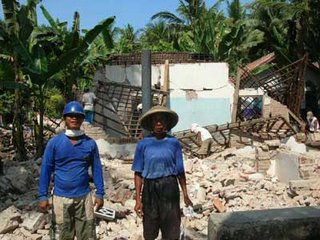
Two members of Pompiers Humanitaires (Humanitarian Firemen) have come to inspect Bebekan. They looked at the houses that were still standing, and declared that all were unsafe except two, but the villagers wanted to bring them down anyway because they are traumatized by the sight of a single shallow crack in a wall. The firemen told them that the houses were still in good shape. The villagers wanted also to destroy the pavilion on top of the hill, next to the cemetery, which serves as a reception hall for guests once a year for the ceremony of Nyadran dedicated to the ancestors. The concrete pillars were cracked and they were afraid the whole structure would collapse over their heads but the firemen told them the cracks were only surface cracks and that the building was in good shape. On the other hand they told the villagers that it was absolutely imperative to destroy a big shaky building on a little promontory projecting over the village road because its collapse would endanger all the people walking on it. But the villagers told us that they did not dare bring it down because it was a tomb belonging to a family that did not live in the village anymore. They must first ask permission to this family.
We made a new distribution of rubber boots and safety goggles for the men who are clearing the rubbles. Every evening the students set up on their camping ground a small medical office, they clean the wounds with sterile compresses, give out the medicine prescribed by visiting doctors. They maintain a list of all the villagers they treat and their related symptoms.
We proposed to the villagers to buy them a new set of musical instruments to replace those that were destroyed by the earthquake. They are very happy about this. Already each evening they play music on bamboo sticks and plastic petrol cans. The instruments are popular and inexpensive but they are difficult to find because they must be made very well since the musicians do not use any amplifiers. The sound of "reog" can carry over two kilometers if the instruments are tuned correctly. To play this music and to be able to dance is the only opportunity to relax in the evening for these men who all day long work hard without any financial gain, in a cloud of dust and on piles of debris, the ruins of their own houses. It is therefore not something superfluous but an essential activity that brings them together around the identity of their village which has been destroyed physically but not spiritually. They showed us an old building which housed a kindergarten for a few years but which had been abandoned because there was not enough funds to continue. The building is badly damaged but we suggested to bring it down and to build on the same spot a cultural center called "sangar" : an open pavilion (pendopo) measuring 9m x 8m with an enclosed part surrounded by accordion doors like those of a warung (kiosk) where we would set up a small library for the children. The musicians and dancers of reog will also be able to hold their daily practices there, and in the aftermost the children activities.
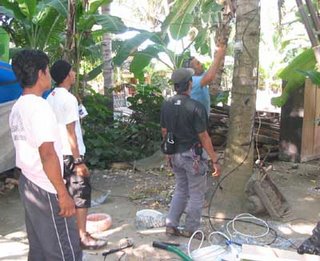 With the expertise of a volunteer architect and in collaboration with the people of Bebekan, we will establish the plans and the projected cost of this structure, knowing that the villages themselves will build it with the gotong-royong system. But of course they first want to work on clearing the rubble, which can take many more weeks. They transport the debris in wooden wheelbarrows to the various rodas of the village which they fill and reinforce. We will find a small truck to speed up the work and lighten up the loads. Meanwhile, a friend petitioned the Atlas NGO to obtain a real big army tent (until now the villagers sleep under plastic tarps suspended on bamboo poles) under which we will organize activities for the children. The Indonesian students who man the posko will be in charge of these activities. Tomorrow we will bring drawing books, a white board, paint, etc.
With the expertise of a volunteer architect and in collaboration with the people of Bebekan, we will establish the plans and the projected cost of this structure, knowing that the villages themselves will build it with the gotong-royong system. But of course they first want to work on clearing the rubble, which can take many more weeks. They transport the debris in wooden wheelbarrows to the various rodas of the village which they fill and reinforce. We will find a small truck to speed up the work and lighten up the loads. Meanwhile, a friend petitioned the Atlas NGO to obtain a real big army tent (until now the villagers sleep under plastic tarps suspended on bamboo poles) under which we will organize activities for the children. The Indonesian students who man the posko will be in charge of these activities. Tomorrow we will bring drawing books, a white board, paint, etc.Four students from Jakarta have arrived to help the villagers clear the rubble. Midu, a Moroccan construction entrepreneur living in Bali, came to install freely and in a very professional way electric cables and neon lights in each tent and along the roads of the village. This morning we bought a great quantity of these cables. Midu will spend the whole day doing the electrical installation. He is assisted by a young hip-hop singer from Jakarta, Geery, whose wife just gave birth to a premature baby in Yogyakarta.
The villagers told us again yesterday that the only aid they have received from the government in the last 13 days amounts to two 25 kg bags of rice, two oil bottles and 4 blankets. No international NGO as yet entered their village to help them, except the voluntary firemen we brought here. The government has announced that it will give 90,000 rupiah (8 euros) per month for each disaster victim (whose house was destroyed). For a family of two children, this amounts to 360,000 rps a month, which is for them a welcome assistance when one knows that the monthly minimum wage in the area of Yogyakarta is lower than 600,000 rps. The chief of the village told us that the total amount will be given to him and that he would be in charge of the distribution. But he estimates that all the people of the village have a right to this aid, since even the very few people whose house withstood the earthquake are affected, they all take part in the gotong-royong, putting all their time and their labor in the cleaning of the houses of the others and the village. He will thus distribute the total sum equally between each person of Bebekan.
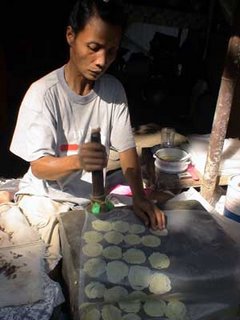 One of the specialties of the women of Bebekan is the production of "emping', a kind of flat chip made with a red acorn called melinjo. These trees grow on the small hill of the village but not in a sufficient number. The women buy the acorns from a supplier, bring them back to the village, make them burst in very hot sand, pound and crush them in small circles and dry them under the sun before frying them. Then they bring back their production to the supplier who gives them 1000 rps (less than 10 centimes) for each kilo of emping. In the stores, the emping are sold for more than 12,000 rps a kilo. The idea would be to plant these melinjo trees in a denser and more efficient way on the hill of Bebekan (it takes about 4 for 5 years for a tree to produces acorns) and to find a sales network in Yogyakarta, so that these women can live decently from their work. Let me emphasize here that the people of Bebekan never ask for anything. It is we who question them each day in order to know what they need. And also that the only operating costs of this adventure are the money which I give each day to the chief of the students manning the posko of Bebekan so that they can buy food for the students camping on the spot, gasoline for their motorbikes, their telephone card, some sheets of paper on which to write their reports. This adds up to about 15 euros per day for the whole group of students.
One of the specialties of the women of Bebekan is the production of "emping', a kind of flat chip made with a red acorn called melinjo. These trees grow on the small hill of the village but not in a sufficient number. The women buy the acorns from a supplier, bring them back to the village, make them burst in very hot sand, pound and crush them in small circles and dry them under the sun before frying them. Then they bring back their production to the supplier who gives them 1000 rps (less than 10 centimes) for each kilo of emping. In the stores, the emping are sold for more than 12,000 rps a kilo. The idea would be to plant these melinjo trees in a denser and more efficient way on the hill of Bebekan (it takes about 4 for 5 years for a tree to produces acorns) and to find a sales network in Yogyakarta, so that these women can live decently from their work. Let me emphasize here that the people of Bebekan never ask for anything. It is we who question them each day in order to know what they need. And also that the only operating costs of this adventure are the money which I give each day to the chief of the students manning the posko of Bebekan so that they can buy food for the students camping on the spot, gasoline for their motorbikes, their telephone card, some sheets of paper on which to write their reports. This adds up to about 15 euros per day for the whole group of students. In putting ourselves at the service of Bebekan in the south of Yogyakarta, we should not forget the Merapi volcano in the north which is very very active. On several evenings, I have gone up with Asep (the coordinator of the student voluntary rescue workers for the volcano and the earthquake), to the refugee camps of Merapi and beyond. All night, the villagers sit in groups on mats laid on the road facing the crater and stand guard. They monitor the lava flows and the volcanic clouds. When the sight of the volcano is obscured by clouds, they rely on its rumble to identify its moods. They stand ready to sound the alarm to the inhabitants who sleep in their houses.
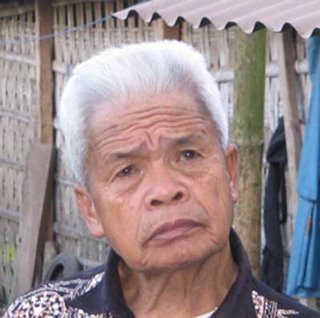 On the evening of the day before yesterday, I went up to see the guardian of the volcano, Mbah Maridjan, who has adopted me as a member of his family a few years ago. That morning, the Merapi had spit an enormous volcanic cloud, all the villages close to the crater were to be evacuated, but Mbah Maridjan remained at his station with people close to him. The access road to the village was blocked not by the army but by the villagers themselves, not because the volcano was dangerous but to prevent Indonesian and international TV crews from badgering the guardian of the volcano who had been hassled for weeks by the media and invent quotes he has never made. He thus does not receive any more any journalist and hides in the kitchen of his house, on a bamboo bed, while his wife cooks on embers lying on the beaten ground. He is hiding not from the volcanic clouds, but from the clouds of journalists and lunatics of all sorts. Human madness is more dangerous than
On the evening of the day before yesterday, I went up to see the guardian of the volcano, Mbah Maridjan, who has adopted me as a member of his family a few years ago. That morning, the Merapi had spit an enormous volcanic cloud, all the villages close to the crater were to be evacuated, but Mbah Maridjan remained at his station with people close to him. The access road to the village was blocked not by the army but by the villagers themselves, not because the volcano was dangerous but to prevent Indonesian and international TV crews from badgering the guardian of the volcano who had been hassled for weeks by the media and invent quotes he has never made. He thus does not receive any more any journalist and hides in the kitchen of his house, on a bamboo bed, while his wife cooks on embers lying on the beaten ground. He is hiding not from the volcanic clouds, but from the clouds of journalists and lunatics of all sorts. Human madness is more dangerous than 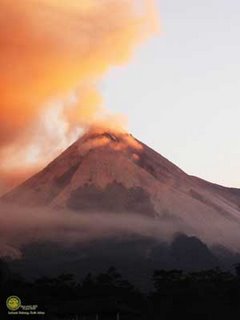 the awakening of a volcano.
the awakening of a volcano. The atmosphere was both calm and tense, the trees and the house roofs were covered with ashes, the crater bubbling with volcanic clouds and lava just above our heads. Further down, the women of the village prepared the ceremonial meal and the offerings for the night. I brought for Mbah Maridjan the coconuts which people of Bebekan have given me for his village.
Elisabeth

0 Comments:
Post a Comment
<< Home